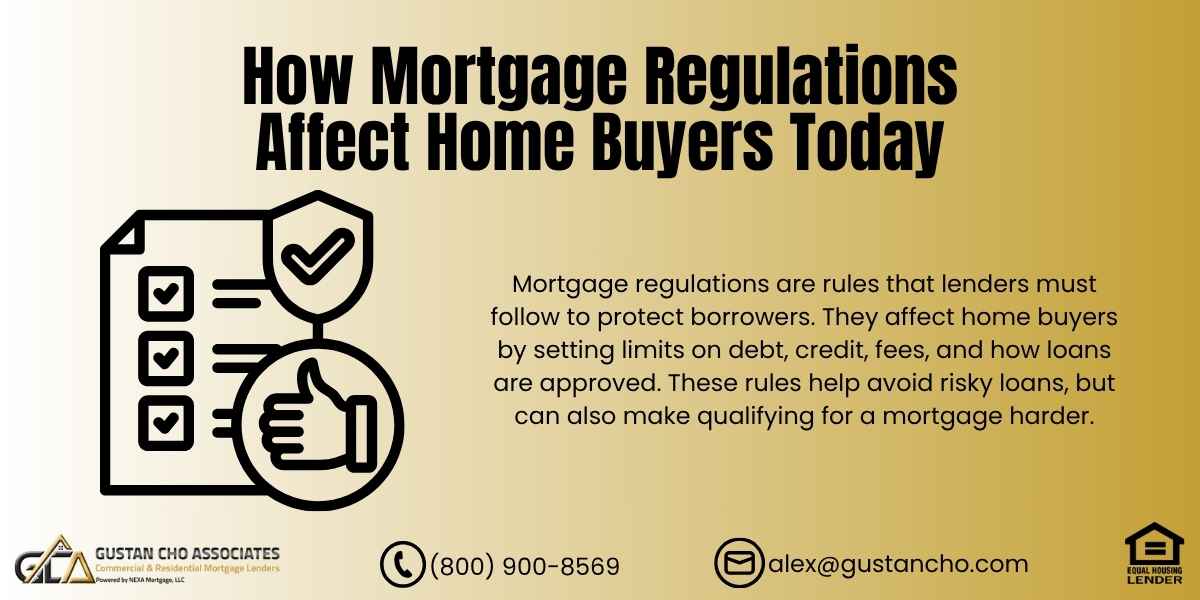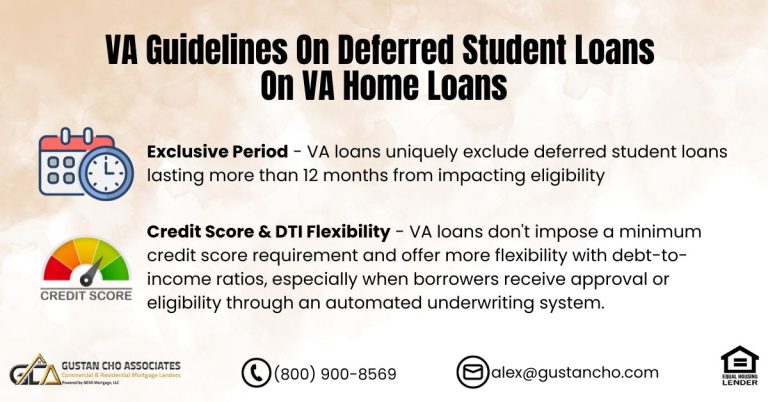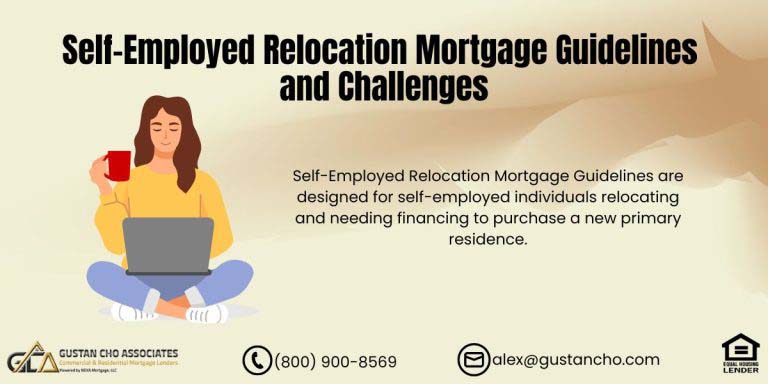How Mortgage Regulations Affect Home Buyers in 2025: What You Need to Know
Buying a home is one of the biggest decisions you’ll ever make. However, understanding how mortgage regulations affect home buyers can feel overwhelming for many people. At Gustan Cho Associates, we simplify the process and help you get approved—even if other lenders said no.
In this guide, we’ll break down mortgage regulations, how they work in 2025, and what you need to know to qualify for a mortgage today.
What Are Mortgage Regulations and Why Do They Matter?
Mortgage regulations are the rules lenders must follow when giving out home loans. These rules protect buyers from risky loans, unfair fees, and predatory lending practices. But sometimes, these same rules can make it harder for honest borrowers to qualify.
Understanding how mortgage regulations affect home buyers is key to getting approved and avoiding surprises.
How Do Mortgage Regulations Affect You as a Homebuyer?
Stay informed about the latest mortgage regulations and how they impact your homebuying process.
Mortgage Rules After the 2008 Crash: Why They Still Matter Today
New regulations were introduced after the 2008 housing crash to prevent another meltdown. These include:
- Dodd-Frank Wall Street Reform Act
- The SAFE Act (requiring licensing and background checks for loan officers)
- The Qualified Mortgage (QM) Rule
- The TRID Rule (Loan Estimate and Closing Disclosure requirements)
- Creation of the CFPB (Consumer Financial Protection Bureau)
These rules changed how lenders qualify buyers, calculate debt, and disclose loan details. They still impact how mortgage regulations affect home buyers in 2025.
How the Qualified Mortgage Rule Affects Borrowers Today
The Qualified Mortgage rule basically says that lenders need to make sure borrowers have the Ability to Repay. That sounds like a pretty good idea, right?
Understanding how mortgage regulations affect home buyers when looking for a loan is important.
Usually, most lenders want your debt-to-income (DTI) ratio to be 43% or lower. But Fannie Mae and Freddie Mac can sometimes allow up to 50% if the situation calls for it. Also, things like interest-only payments and balloon payments are generally a no-go. Plus, the total fees and charges for the loan can’t exceed 3% of the loan amount, which helps protect buyers from getting hit with too many costs.
While these rules protect buyers, they can limit how much you qualify for, especially if you’re self-employed or have variable income.
How Loan Limits and Credit Rules Impact Home Affordability
Each year, FHA and conforming loan limits are updated based on rising home prices. For 2025:
- The FHA loan limit in most areas is $498,257
- The conforming loan limit for conventional loans is $766,550
- High-cost areas go up to $1,149,825 for FHA and $1,149,825 for conforming loans
But even with higher loan limits, borrowers are feeling squeezed. Why?
- Stricter credit score minimums (most lenders want 620+, some require 680+)
- Loan-level price adjustments (LLPAs) make loans more expensive for lower credit scores or higher LTVs
- Overlays by lenders (extra rules on top of agency guidelines)
At Gustan Cho Associates, we offer no overlay lending on government and conventional loans, helping more buyers qualify.
TRID, Loan Estimates, and Closing Disclosures Explained
Understanding how mortgage regulations affect home buyers is important, as it informs them of their rights regarding fees and disclosures. Since 2015, lenders must provide a Loan Estimate (LE) within three business days of a mortgage application. This document outlines the estimated costs associated with the loan, giving buyers an overview of what to expect financially.
Additionally, borrowers receive a Closing Disclosure (CD) containing the final loan numbers and must be delivered at least three days before the closing date. If lenders fail to accurately disclose costs, specifically under-disclosing by more than 10%, they are responsible for covering the difference. This regulation protects home buyers from unexpected fees during the closing process, ensuring a more transparent transaction.
2025 Mortgage Rate Concerns: What Regulations Have to Do With It
While interest rates are set by market forces and Federal Reserve policy, regulations impact how rates are passed on to borrowers.
For example:
- G-Fees (Guarantee Fees): Extra fees added by Fannie Mae and Freddie Mac to offset risk. Passed to borrowers in the form of higher rates.
- New LLPAs (Loan-Level Price Adjustments): In 2023-2024, Fannie and Freddie added higher fees for certain borrowers. These are still in place in 2025.
If you’re a buyer with a lower credit score or small down payment, these pricing changes can raise your rate unless you work with a lender who knows how to navigate around them.
Understanding Mortgage Regulations—What Homebuyers Need to Know
Get the facts on how current mortgage rules can influence your eligibility and loan options.
How Mortgage Regulations Affect First-Time Home Buyers the Most
First-time homebuyers are in a unique spot. Many are younger folks with little credit history, which can make getting a mortgage tough. Plus, many are dealing with student loan debt, and finding enough cash for a down payment and closing costs can be tricky.
Mortgage rules can really shake things up for these aspiring homeowners. Stricter debt-to-income (DTI) limits can make it harder to get approved for loans.
And if someone has a lower credit score, they often face higher costs, which can be a real buzzkill when buying a home. The process to verify income has also gotten tougher, especially for gig workers or seasonal jobs, since they might not have the usual pay stubs to show.
Luckily, Gustan Cho Associates is there to help first-time buyers tackle these challenges. They have options for people with lower credit scores, like FHA loans that only need a 3.5% down payment and offer more flexible rules. They provide helpful resources for down payment assistance programs. This support helps many people achieve their dream of owning a home and start their exciting journey.
Non-QM Loans: A Solution When Regulations Shut You Out
If the rules are too tight for you to qualify for a QM loan, Non-QM (Non-Qualified Mortgage) loans can be a great alternative.
Popular Non-QM Options in 2025:
- Bank Statement Loans: These loans let you qualify by showing your bank statements from the past 12 to 24 months instead of needing tax returns. This option is great for self-employed individuals or those with variable incomes.
- DSCR Loans: Designed for real estate investors, these loans allow you to qualify based on the rental income your properties generate, rather than your personal income. This makes it easier for investors to secure funding for new properties.
- Asset Depletion Loans: With these loans, you can qualify using the total value of your liquid assets, like cash or investments, rather than relying on a regular paycheck. This is helpful for those who have significant savings but may not have a traditional income.
- No Waiting Period Loans: These loans allow you to get financing right after going through tough financial times, like bankruptcy, foreclosure, or a short sale, without waiting for a certain period. This option helps people get back on their feet more quickly.
These programs help buyers who are:
- Self-employed
- Recently experienced financial hardship
- Investing in real estate
How to Qualify for a Mortgage With No Overlays in 2025
Many banks and lenders implement “overlays,” which are additional rules that go beyond standard guidelines for FHA, VA, USDA, or conventional loans. These overlays can often disqualify potential borrowers who would otherwise qualify. This can significantly impact home buyers, as it limits their access to financing despite having a solid financial standing.
Understanding how mortgage regulations affect home buyers is crucial, as navigating these extra hurdles can create barriers to home ownership for many.
At Gustan Cho Associates, we strive to make the home buying process more accessible by offering mortgages without overlays. This means we adhere strictly to agency guidelines, allowing us to say YES when others say NO. We provide approvals for borrowers with credit scores as low as 500 on FHA loans and work with those who have faced bankruptcies, foreclosures, or require manual underwriting.
Furthermore, our diverse reach includes licensing in 50 states and access to over 220 wholesale lending partners, ensuring we are equipped to meet various financing needs.
Mortgage Regulations and Your Home Purchase: What’s Changed?
Understand the new mortgage rules and how they could affect your homebuying experience.
The Bottom Line: Don’t Let Mortgage Regulations Stop You
How mortgage regulations affect home buyers can sometimes make purchasing a home feel more daunting. However, these regulations are in place to protect you. With the right loan officer and lender by your side, these rules don’t have to hinder your home buying experience.
At Gustan Cho Associates, we specialize in helping:
- First-time homebuyers
- Borrowers with low credit scores
- Self-employed individuals
- Buyers denied by other lenders
We cut through the red tape, explain every step, and close loans fast, even when others cannot.
Borrowers who need a five-star national mortgage company licensed in 50 states with no overlays and who are experts on how mortgage regulations affect home buyers, please contact us at 800-900-8569, text us for a faster response, or email us at gcho@gustancho.com. The team at Gustan Cho Associates is available 7 days a week, on evenings, weekends, and holidays.
Frequently Asked Questions About How Mortgage Regulations Affect Home Buyers:
Q: What are Mortgage Regulations, and How do They Affect Home Buyers?
A: Mortgage regulations are rules that lenders must follow to protect borrowers. They affect home buyers by setting limits on debt, credit, fees, and how loans are approved. These rules help avoid risky loans, but can also make qualifying for a mortgage harder.
Q: Why is it Important to Understand How Mortgage Regulations Affect Home Buyers?
A: Understanding how mortgage regulations affect home buyers helps you avoid surprises, know your rights, and get prepared. The more you know, the easier it is to qualify for the right loan and avoid getting denied.
Q: How do Debt-to-Income Rules Limit What I Can Afford?
A: Most loans follow a 43% debt-to-income (DTI) limit, meaning your monthly debts can’t be more than 43% of your income. This rule affects how much home you can afford and is a big way how mortgage regulations affect home buyers.
Q: What are Overlays, and How do They Stop People from Buying Homes?
A: Overlays are extra rules added by lenders on top of government loan guidelines. Even if you meet FHA, VA, or Fannie Mae rules, overlays could still get you denied. This is a major way how mortgage regulations affect home buyers, but at Gustan Cho Associates, we don’t use overlays.
Q: Can I Still Get a Mortgage with Bad Credit or Past Bankruptcy?
A: Yes! Many lenders have strict rules, but at Gustan Cho Associates, we work with borrowers with low credit scores—even down to 500 on FHA—and no waiting period after bankruptcy or foreclosure.
Q: How do Mortgage Regulations Affect First-Time Home Buyers?
A: First-time buyers often have limited credit, student loans, or little savings. Mortgage regulations can make qualifying harder, but we offer flexible programs like FHA loans, down payment help, and low credit score approvals.
Q: What is a Non-QM Loan, and Why Would I Need One?
A: Non-QM (Non-Qualified Mortgage) loans are for buyers who don’t fit the standard rules. These loans may work better for you if you’re self-employed or recently had financial issues.
Q: What are Loan Estimates and Closing Disclosures, and Why Do They Matter?
A: These documents show your loan’s fees and costs. Regulations require that you get them early and accurately. If lenders mess up, they may have to cover the cost. It’s another way how mortgage regulations affect home buyers by making the process fairer and transparent.
Q: How do Mortgage Regulations Impact Interest Rates?
A: Rules like G-Fees and Loan-Level Price Adjustments can raise rates for certain buyers. This affects how much your monthly payment will be. Working with a lender who understands how mortgage regulations affect home buyers can help you avoid extra costs.
Q: Can Gustan Cho Associates Help Me if I’ve Been Denied by Another Lender?
A: Yes! We specialize in helping borrowers that other lenders deny. We don’t add extra rules (overlays), and we know how mortgage regulations affect home buyers. We get loans approved that others turn away.
This blog about “How Mortgage Regulations Affect Home Buyers Today” was updated on August 6th, 2025.
How Current Mortgage Regulations Influence Your Homebuying Power
Learn how to navigate the latest mortgage regulations and make smarter decisions as a homebuyer.










